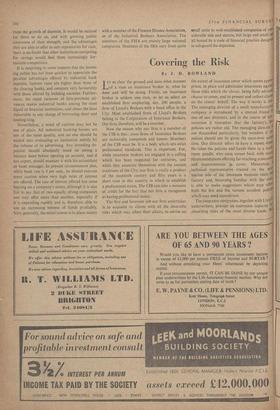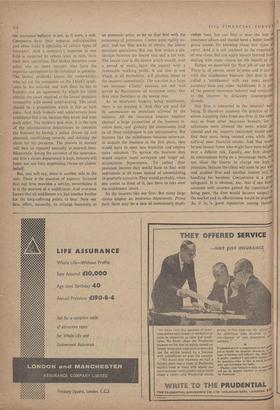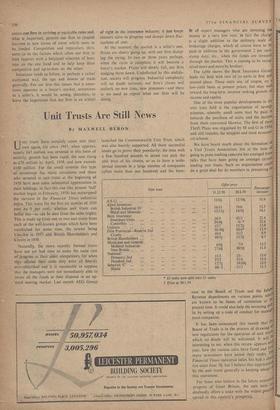Covering the Risk
By J. D. ROWLAND
ET us clear the ground and state what manner of a man an insurance broker is; what he does and will be doing. Firstly, an insurance broker is seldom one man, so let us select an established firm employing, say, 200 people; a firm of Lloyd's Brokers with a head office in the City. Most established firms of Lloyd's Brokers belong to the Corporation of Insurance Brokers. Our firm, therefore, will be a member.
Now the reason why our firm is a member of the CIB is this: most firms of Insurance Brokers are technically competent and honest. Members of the CIB must be. It is a body which sets strict professional standards. This is important. For, while insurance brokers are engaged in a calling which has been respected for centuries, and while they associate themselves with the ancient traditions of the City, our firm is really a product of the twentieth century and fifty years is a short time in this country in which to establish a professional status. The CIB can take a measure of credit for the fact that our firm is recognised as having professional status.
The first and foremost job our firm undertakes is to acquaint its clients with all the insurable risks which may affect their affairs, to advise on
the extent of insurance cover. which seems apPr(' priate, to place and administer insurances agaitli' those risks which the clients, being fully advised choose to cover, and to present and collect daily' on the clients' behalf. The way it. works is this The managing director of a small manufacturilli company is introduced by a mutual friend I° one of our directors, and in the course of coil' versation it transpires that the factory's policies are rather old. The managing director is not dissatisfied particularly, but wonders if lb: polices should not be given the once-over time. Our director offers to have a report door' He takes the policies and hands them to a bacI'' room pundit, who soon comes back with m:111) recommendations offering far-reaching econonlI6 and improvements in cover. Meanwhile technical representative trained on the se, marine side of the insurance business visits factory and, becoming familiar with the is able to make suggestions which may afro both the fire and the various accident polici°, which may need amendment.
The insurance companies, together with underwriters, provide an enormous capacity PIA° absorbing risks of the most diverse kinds. 13
the insurance industry is not, as it were, a unit. Companies have their separate individualities and often make a speciality of certain types of insurance. And a company's expertise in one field is respected by others who, in turn, have their own specialities. Our broker therefore must select one or more insurers who have the expertise appropriate to the insurance in question. The broker probably knows the underwriters who act for the companies or the Lloyd's syndi- cates he has selected, and with them he has to hammer out an agreement by which his client obtains the cover required at the lowest premium compatible with sound underwriting. The result should he a proposition which is fair to both sides. And both brokers and underwriters have confidence this is so, because they know and trust each other. The broker's task over, it is the turn of the administrative departments to complete the business by having a policy drawn up and executed, establishing records, and debiting the client for his premium. The process in essence will then be repeated annually at renewal time. Meanwhile, during the currency of the insurance, our firm's claims department is kept, insurers will hope, not too busy negotiating claims on clients' behalf.
But, you will say, there is another side to the coin. There is the question of expense. Granted that our firm provides a service, nevertheless it is in the position of a middleman. And everyone knows that all middlemen are just another burden for the long-suffering public to bear. Now our firm offers, naturally, to arrange insurance at an economic price, so let us deal first with the economics of premiums. Clients quite rightly ex- pect, and our firm works to obtain, the lowest premium quotations. But our firm makes a dis- tinction between the lowest rate and a cut rate. The lowest rate is the lowest which should, over a period of years, leave the insurer with a reasonable working profit. A cut rate is one which, in all probability, will produce losses to the insurers immediately. The reaction is a large rate increase. Clients' interests are not well served by fluctuations of insurance costs. Our firm aims therefore at the lowest rate.
As to insurance brokers being middlemen, there is no denying it. And they are paid for by commission on premiums allowed by the insurers. All the insurance brokers together channel a large proportion of the business in- surers have, and globally the commission paid to all these middlemen is not unimpressive. But insurers like the middlemen because•otherwise, to acquire the business in the first place, they would have to open new branches and employ more salesmen. To service the business they would require more surveyors and larger ad- ministrative departments. To collect their premium income they would have to deal with individuals at all times instead of consolidating in quarterly accounts. They would probably, when one comes to think of it, just have to take over the middlemen intact.
So the insurers like our firm. But many large clients employ an insurance department. Prima facie there may be a case of unnecessary dupli- cation here, but our firm is near the hub of insurance affairs and should have a better intellr gence system for knowing about new types 01 cover. And it is not confined to the experienLI of one client, but can apply lessons learned &oil dealing with many clients for the benefit of all Earlier we described the 'first' job of our firnt. There is, of course, more to conic and it ties ill with this middleman business. Our firm is nol called a 'middleman' with any more precis( accuracy than any other middlemen. It is pall of the general insurance industry and connects, to the insurers by delicately counterpoise threads.
Our firm is interested in the insurers' well being. It therefore supports the practice of in"; surers accepting risks from our firm in the serge! way as from other insurance brokers; for If, unfairness were allowed 'the news would gel' around and the insurers concerned would soul' find their arms being twisted even while 110 suffered poor financial results. And that be one insurer fewer who might have been helplo over a difficult risk. Equally, our firm, desPil‘, its commissions being on a percentage basis, s‘'.' not allow the insurer to charge too high . premium, because the client will soon be put %+1: and another firm and another insurer will handling his business. Competition is a gro31 safeguard. It is obvious, too, that if our firm accounts with insurers gained the reputation being poor, the firm would become suspect I' the market and its effectiveness would be bluntd As it is, 'a good reputation among insureP
assists our firm in arriving at equitable rates and, what is important, permits our firm to interest insurers in new forms of cover which seem to be needed. Competition and reputation, then. seem to be the factors which allow our firm to feed insurers with a balanced selection of busi- ness on the one hand and to help keep them competitive and up-to-date on the other.
Insurance tends to follow, in perhaps a rather cushioned way, the ups and downs of trade generally. For our firm this means that it some- times operates in a buyer's market, sometimes in a seller's. It would be wrong, therefore, to leave the impression that our firm is an arbiter of right in the insurance industry; it just keeps insurers alive to progress and damps down fluc- tuations of cost.
At the moment the market is a seller's one. Prices are slowly going up, with our firm damp- ing the swing. In two or three years perhaps, when the cycle is complete, it will become a buyer's market. Prices will slowly fall, our firm nudging them down. Undellected by this undula- tion, society will progress. Industrial complexity will no doubt increase; our firm's clients will embark on new lines, new processes—and there is no need to repeat what our firm will be doing.
















































 Previous page
Previous page